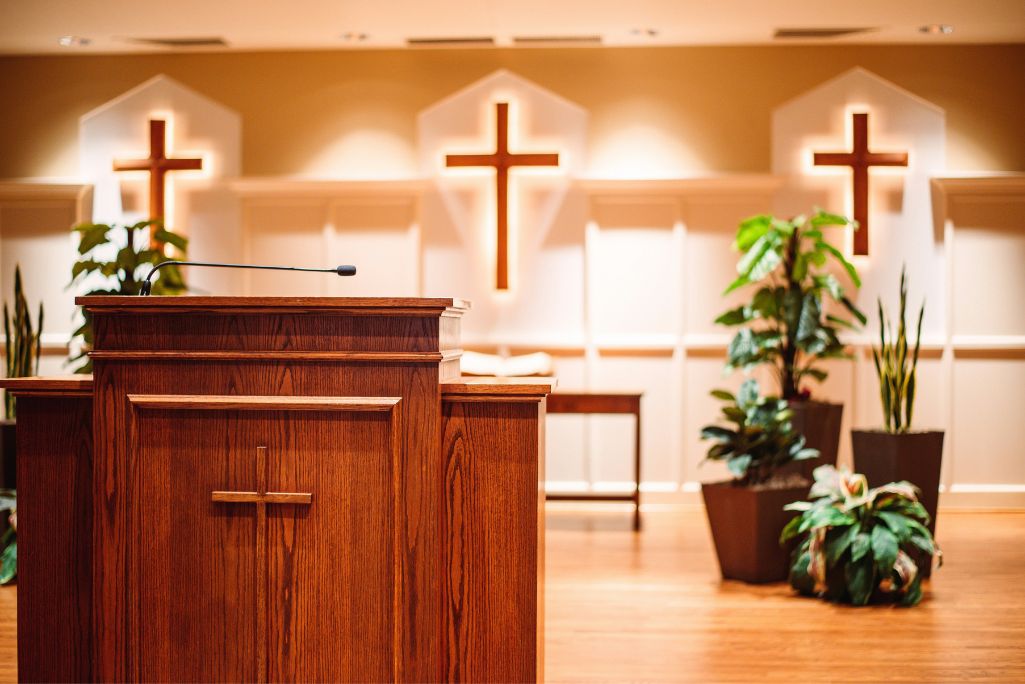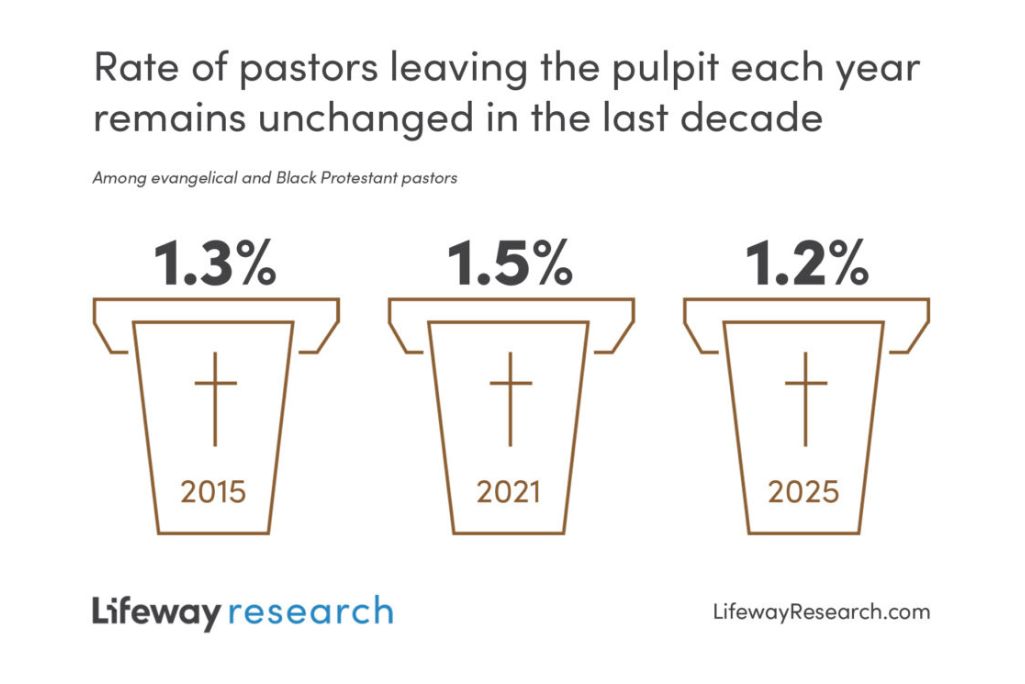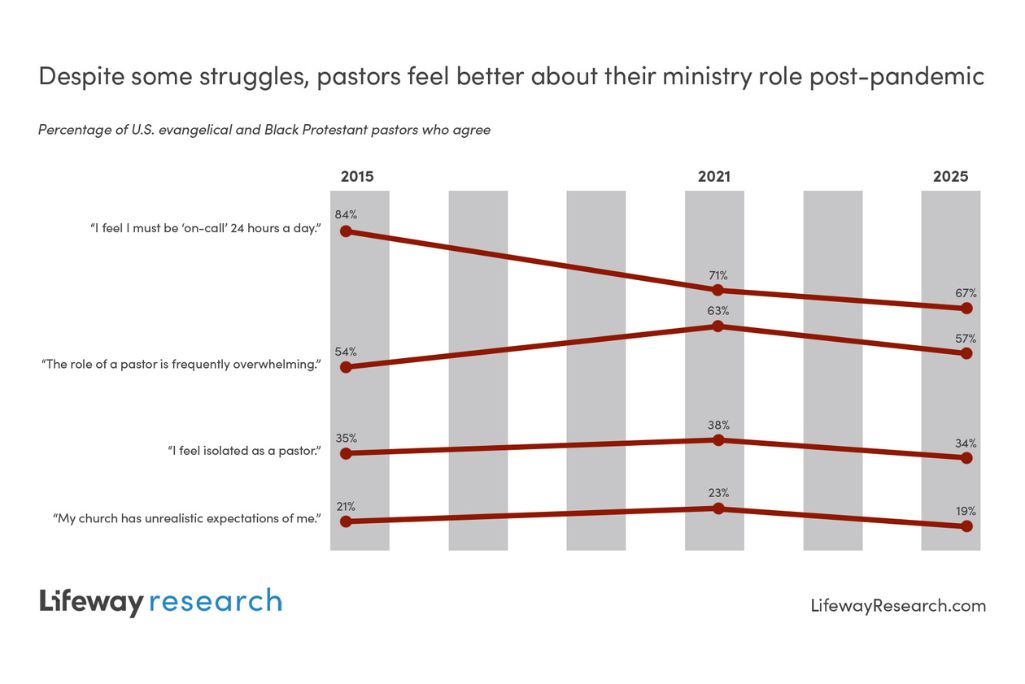
BRENTWOOD, Tenn. — Pastors face unique challenges in their role and often feel overwhelmed, but few decide to step away from the pulpit and pursue another career.
Only around 1 in 100 pastors leave the ministry each year, according to a Lifeway Research study of evangelical and Black Protestant pastors. The percentage of pastors who leave for reasons other than retirement or death has remained statistically unchanged over the past decade: 1.3% in 2015, 1.5% in 2021 and 1.2% in 2025.
“The rate of pastors departing the pastorate is steady and quite low given the demands of the role,” said Scott McConnell, executive director of Lifeway Research. “Many of those leaving the pastorate feel they are moving at God’s direction to another role of ministry. However, it’s easy for those outside and those inside the church to fixate on those who leave because of conflict, burnout or moral failure. Speculation always overstates these cases, yet these are the outcomes churches can seek to prevent.”
The 2025 study, sponsored by Houston’s First Baptist Church and Richard Dockins, an occupational medicine physician concerned about pastoral attrition, surveyed more than 1,500 pastors serving in evangelical or Black Protestant churches. The median pastoral tenure at one church is eight years.
Around 3 in 5 pastors (58%) started their role at their church during the last 10 years. Only 15% say their ministry at their current church stretches back at least 25 years. Additionally, half of pastors (52%) are serving at their first church, while 48% have served a previous church in that role.
Among those churches that existed and had a pastor 10 years ago, 44% still have the same pastor today. Around 1 in 5 (21%) say the previous pastor retired, while 16% are pastoring another church and 7% died.
In the past decade, 7% of pastors left and began working in a ministry role other than pastor, 3% work in a non-ministry role and 2% are involved in something that is not ministry-related and are not retirement age. These groups that leave the pastorate before retirement reveal a current annual attrition rate of 1.2% among evangelical and Black Protestant pastors. This means that in any given year since 2015, slightly more than 1 in 100 pastors walked away from the pulpit.
When the current pastors were asked why the former pastor left the ministry, the most common reasons were a change in calling (37%), conflict in a church (23%) and burnout (22%). Others left because of a poor fit with a church (17%) or family issues (12%). Few were forced to step away because of an illness (5%) or personal finances (3%). Another 4% left because they weren’t prepared for the job. Of the 1.2% of pastors who leave the ministry each year, 7% are forced out due to moral or ethical issues.
“Today’s pastors don’t always know all the reasons their predecessors left their church, but the number of pastors describing the previous pastor at their church leaving because of burnout has doubled over the last 10 years (22% v. 10%),” said McConnell.
Pastoral changes

Among the current pastors who previously served at another church, most left their previous congregation of their own volition. Half (50%) say they left because they took the church as far as they could. Three in 10 (31%) felt their family needed a change. A quarter (25%) left due to conflict in the church, while 21% walked away because the church did not embrace their approach to ministry.
Fewer say they left their previous church because the congregation had unrealistic expectations of them (17%), they were not a good fit for the church (17%) or another reason like feeling God called them elsewhere or to a new opportunity (13%). For some, the decision to leave was made for them, as 13% were reassigned and 8% were asked to leave the church.
“A pastor and congregation must work together,” said McConnell. “Maintaining unity is a biblical mandate that is easy to ignore when someone places too much importance on their own opinion.”
Most pastors who previously led a different church had some conflict in the other congregation. More than a third say there was conflict over proposed changes (37%) or with lay leaders (35%). Similarly, 35% say they experienced a significant personal attack.
Around a quarter felt conflict over their leadership style (27%) or expectations about the pastor’s role (24%). Fewer clashed with their previous congregation over doctrinal differences (18%) or national or local politics (9%). Around a third (35%) say they didn’t experience any of these conflicts in their earlier church.
Most current pastors don’t foresee leaving the ministry behind for one of those reasons. Nine in 10 (91%) are sure they can stay at their church as long as they want. Still, that doesn’t mean pastors are naïve about potential future problems.
Coming conflict

Evangelical and Black Protestant pastors in the U.S. expect to face conflict in their current congregations, even though they are working to limit it. Three in 4 (74%) say they will need to confront conflict in their church in the future, while a quarter (24%) disagree. Additionally, 1 in 5 (19%) say their church experienced significant conflict last year.
But most pastors have received training to deal with such issues and are monitoring their churches for brewing trouble. Around 9 in 10 (88%) say they consistently listen for signs of conflict in their church. A similar percentage (90%) say they invest in processes and behaviors to prevent conflict.
Around 3 in 4 (73%) say their training prepared them for the people side of ministry. The percentage of pastors who felt their seminary or ministry training prepared them has dropped from 80% in 2015 to 77% in 2021, before falling to 73% today.
That decline may be connected to the shrinking number of pastors participating in related classes. In 2015, 75% of pastors had taken courses on dealing with conflict, and 72% had taken courses on interpersonal skills. Now, those percentages have fallen to 66% and 63% respectively.
“Pastors’ awareness of conflict remains high, but fewer are preparing in a classroom setting to love and lead through various disagreements,” said McConnell.
If many of the preventative steps don’t work, most pastors say their church has steps to address more serious conflicts and issues. Three in 4 (75%) have a process for church discipline.
Ministry troubles
Pastors may not believe their problems are tied specifically to conflict in their congregations, but generally to their role. Two in 3 (67%) feel they must be “on call” 24 hours a day. This feeling has declined steadily among pastors, however, from 84% in 2015 and 71% in 2021. Another 57% say their role is frequently overwhelming, up slightly from 54% in 2015 but down from 63% in 2021.
Around half (47%) of pastors often feel the demands of ministry are greater than they can handle. This has remained consistent for the past decade. A third (34%) feel isolated as a pastor, unchanged from 2015 but down from 38% in 2021 during the COVID-19 pandemic. One in 5 (19%) say their church has unrealistic expectations of them. This is again consistent with 2015 (21%) but down from 2021 (23%).
“While a couple elements of panic may have eased since the pandemic, the role of being a pastor is still difficult,” McConnell said. “Pastors and their families genuinely need encouragement, people to share ministry tasks with and to discuss differences respectfully.”
Many congregations seek to avoid issues with their pastor by having a document that clearly communicates the church’s expectations of the pastor (72%). Still, around 1 in 5 pastors (21%) don’t believe their church accurately described the congregation before they arrived.
Despite any potential gaps in the perspectives of the pastor and the congregation, 85% of pastors feel free to say “no” when expectations of them are unrealistic. But this has dropped from 89% in 2015.
During their week, 78% of pastors say they “unplug” from ministerial work and have a day of rest at least once a week, but this is down from 85% in 2015. Some may get even more time away from their ministry work. A third (32%) of pastors say their church has a plan for the pastor to receive a sabbatical periodically, up from 29% in 2015.
Potential warning signs
As pastors seek to avoid problems within their congregations and stay faithful in ministry, they may also want to evaluate themselves. Many aren’t investing in their personal spiritual growth daily, and some may struggle with spiritual pride.
Around half of pastors (54%) say they get away to spend time alone with God at least seven times a week. Other pastors have fewer occasions during which they spend time in Bible study and prayer other than in their sermon or lesson preparation, including 9% who say they do so six times a week, 17% five times, 7% four times, 7% three times, 3% two times, 1% one time and 1% find no time.
Close to 1 in 6 (16%) say they frequently get irritated with people at their church, with only 2% strongly agreeing. Slightly more than half (55%) strongly disagree, so for a large percentage of pastors, irritation with churchgoers may be an issue.
Certain attitudes may not be problematic for some pastors but may be for others. Two in 5 (39%) believe their church would not have achieved the progress it has without them. Three in 4 (73%) say they deserve the respect of their people. More than 4 in 5 (84%) work hard to protect their image as a pastor.
“While pastors may be quick to point to God’s provision for their churches and the fact they have maintained their integrity, agreement with these statements may also suggest the presence of self-importance,” said McConnell. “Leading by example, winning trust and serving where God places you are necessary traits of a pastor that can easily become narcissistic when too focused on the importance of your role, your image or what you deserve.”
For more information, view the complete report, the 2025-2021-2015 comparison report and visit LifewayResearch.com.
Methodology
The study was sponsored by Houston’s First Baptist Church and Richard Dockins, M.D. The mixed-mode survey of 1,516 evangelical and Black Protestant pastors was conducted April 1 — May 8, 2025, using both phone and online interviews. Phone: The calling list was a random sample, stratified by church membership, drawn from a list of all churches in all evangelical and Black Protestant religious traditions except Southern Baptists. Online: The email list was a random sample drawn from all Southern Baptist congregations with an email address. Invitations were emailed to the pastor by Lifeway Research, followed by two reminders. Each survey was completed by the senior pastor, minister or priest at the church contacted.
The completed sample is 1,516 surveys (1,010 phone, 506 online). Responses were weighted by region, church size and denominational group to reflect the population more accurately. The sample provides 95% confidence that the sampling error does not exceed plus or minus 2.7%. This margin of error accounts for the effect of weighting. Margins of error are higher in subgroups. Comparisons are made to two previous surveys conducted by Lifeway Research:
- A study using the same methodology of 1,576 evangelical and Black Protestant pastors conducted Aug. 17-Sept. 15, 2021, sponsored by Houston’s First Baptist Church and Richard Dockins, M.D.
- A phone survey of 1,500 evangelical and Black Protestant pastors conducted March 5-18, 2015, sponsored by the North American Mission Board and Richard Dockins, M.D.
(EDITOR’S NOTE — Aaron Earls is a writer for LifeWay Christian Resources.)


